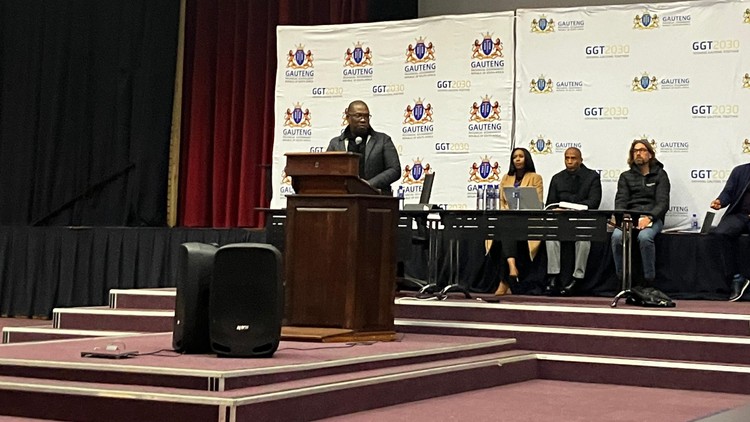
24 June 2024
Gauteng Premier Panyaza Lesufi speaking at a meeting with about 300 non-profit organisations and provincial social development officials on Saturday in an attempt to resolve the funding crisis. Photo: Masego Mafata
Gauteng Premier Panyaza Lesufi has again intervened to try to resolve catastrophic funding failures by the provincial department of social development.
Lesufi met hundreds of representatives of non-profit organisations at the Alberton Council Chambers in Johannesburg on Saturday. He told them he was there “to fix the mess I never created”.
Many organisations providing critical services to vulnerable people in the province have been devastated by the department’s failure to allocate funding and pay subsidies.
One representative voiced her anger that Lesufi and the department had not apologised for the debacle to date.
The Premier replied, “We were told we must apologise for our incompetence, and we are complicit in this act. Me and incompetence are not friends, and I will never be friends with something that is so bad, but if it pleases the house, I will apologise.”
This was Lesufi’s second meeting this year with the desperate organisations. At the first meeting, in early May, he promised to speed up payments, reverse budget cuts, and fix issues with service-level agreements.
However, the department failed to meet the payment deadlines set by the Premier, prolonging the difficult conditions the organisations have been working under.
On Saturday, many organisations complained that they remain in the dark about the status of their funding applications and the payment of their subsidies.
Delays in this year’s funding process were caused by a new centralised funding adjudication system which fell apart and caused serious mistakes in the service-level agreements sent to organisations.
The meeting was attended by about 300 representatives, some of whom had come from the borders of the province, from Hammanskraal, north of Pretoria, and Drieziek, near Vereeniging in the south. With no chairs left in the packed room, nearly half of them were forced to stand for about two hours, before officials finally found more chairs.
In attendance were officials from the Gauteng government including social development MEC Mbali Hlophe, Finance MEC Jacob Mamabolo, and the acting head of the social development department, Bongani Ngomane.
Organisations accused the department of not being transparent and of poor communication, despite the Premier’s commitment to set up a help desk in May.
One representative said at the meeting: “We travelled far, giving up our weekends and using our own money to come to these meetings. Because when we email you Mr Ngomane, you don’t reply. When we call your help desk, there is no answer. You have failed us … the way you treat us is a sign that you don’t care about us and our beneficiaries.”
Another major issue raised by frustrated representatives was the freeze on funding as a result of the department’s forensic investigations. This has affected several shelters and drug rehabilitation centres.
Nhlanhla Zwane, director at the African Youth Development Fund, asked officials how the department could stop funding them on the basis of allegations that the organisation was unaware of.
“When the acting HOD [Bongani Ngomane] says investigations are done, it implies that there have been findings. How can you say the investigation is concluded when no questions have been put to us? And our books have not been investigated,” said Zwane.
Before leaving the meeting at noon, Lesufi instructed officials from social development and treasury not to leave the premises until all the organisations’ queries were attended to.
It was decided that organisations whose applications for funding are still under investigation will meet at the department’s head office in Johannesburg on Wednesday and be provided with information on the investigations. They will be issued with service-level agreements in advance of the meeting. Those cleared of allegations will have their service-level agreements signed.
Officials explained to organisations which had been found to be non-compliant and told they would not receive funding, why this was the case and how they should rectify outstanding issues.
Other organisations previously funded by the department but not on the department’s 2024/25 list for funding were told they would receive formal reasons for why their applications were unsuccessful.